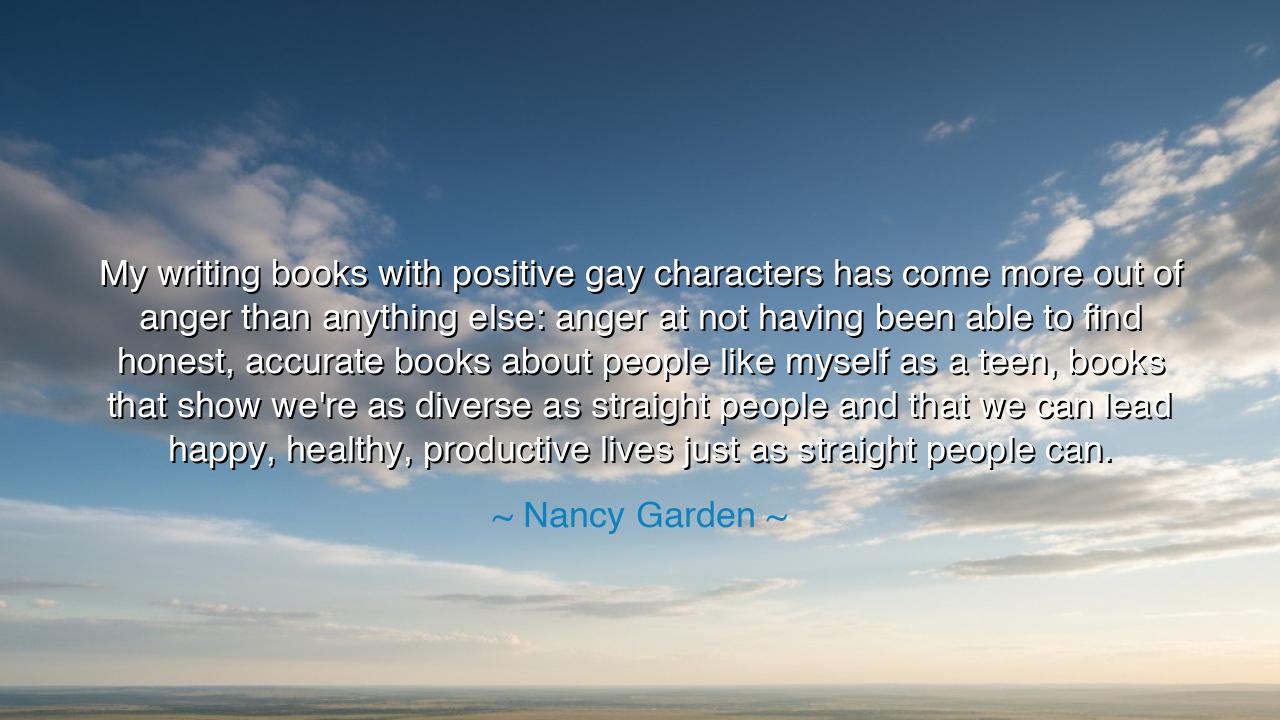
My writing books with positive gay characters has come more out
My writing books with positive gay characters has come more out of anger than anything else: anger at not having been able to find honest, accurate books about people like myself as a teen, books that show we're as diverse as straight people and that we can lead happy, healthy, productive lives just as straight people can.






Hear the strong and unflinching words of Nancy Garden, who declared: “My writing books with positive gay characters has come more out of anger than anything else: anger at not having been able to find honest, accurate books about people like myself as a teen, books that show we’re as diverse as straight people and that we can lead happy, healthy, productive lives just as straight people can.” These words are not gentle musings but a cry of defiance, born from the fire of injustice and the hunger for representation. They echo across generations as a testament that the written word can be both sword and shield, both balm and battle cry.
The meaning of this saying lies first in the recognition of absence. As a teen, Garden searched for herself in the shelves of libraries and bookstores and found only silence or distortion. Where straight youth saw endless mirrors reflecting their joys, sorrows, and possibilities, queer youth found erasure, caricature, or tragedy. This absence was a wound, and from that wound rose anger—not the anger of destruction, but the anger that fuels creation, the anger that says, If no one else will give me a voice, I will carve it myself.
The origin of this fire is found in Garden’s own groundbreaking work. In 1982 she published Annie on My Mind, one of the first young adult novels to portray a lesbian relationship with honesty, tenderness, and hope. In a time when queer characters were often doomed to misery or death, Garden dared to write a story where they could live, love, and thrive. Her book became a beacon to countless readers who had long been told their desires were shameful or impossible. Yet it was not born of calm inspiration but of righteous fury at injustice. Thus, Garden shows us that anger, rightly directed, can become the seed of healing.
History too confirms this truth. Consider the enslaved Frederick Douglass, who taught himself to read despite the chains that forbade him. His anger at oppression did not consume him but drove him to write narratives that revealed the horrors of slavery and proved the dignity of his people. His words broke silence, just as Garden’s books broke the silence surrounding queer youth. In both, anger became not a poison but a force of liberation, a channel through which light could enter the world.
Garden also reminds us of the diversity of human lives. She writes not only against absence but against narrowness: the idea that all queer people fit one tragic mold. By creating gay characters as varied, complex, and hopeful as straight ones, she affirmed that queerness is not a shadow but part of the radiant spectrum of humanity. This is the heart of representation: to show not only that we exist, but that we can live happy, healthy, productive lives—that we are not exceptions, but equals.
The lesson for us is clear: when you find absence, speak; when you find misrepresentation, create truth. If you cannot find yourself in the stories the world tells, then you must become the storyteller. For silence is not neutral—it wounds, it isolates, it denies. But words, once written, can heal, connect, and affirm. Garden’s books remind us that art is not merely entertainment but survival, not merely reflection but revolution.
Therefore, let us act with courage. Let each one of us examine the silences in our world and dare to fill them. Let us write, speak, and create characters, histories, and futures that affirm the dignity of all. And let us remember Garden’s wisdom: that anger at injustice can be the fire that lights the way toward truth. To the young who search in vain for themselves in the stories of their age, let us leave no shelf empty, no voice unheard. For the greatest act of love we can offer is to ensure that all may look into the mirror of story and see themselves not erased, not broken, but alive, radiant, and free.






AAdministratorAdministrator
Welcome, honored guests. Please leave a comment, we will respond soon